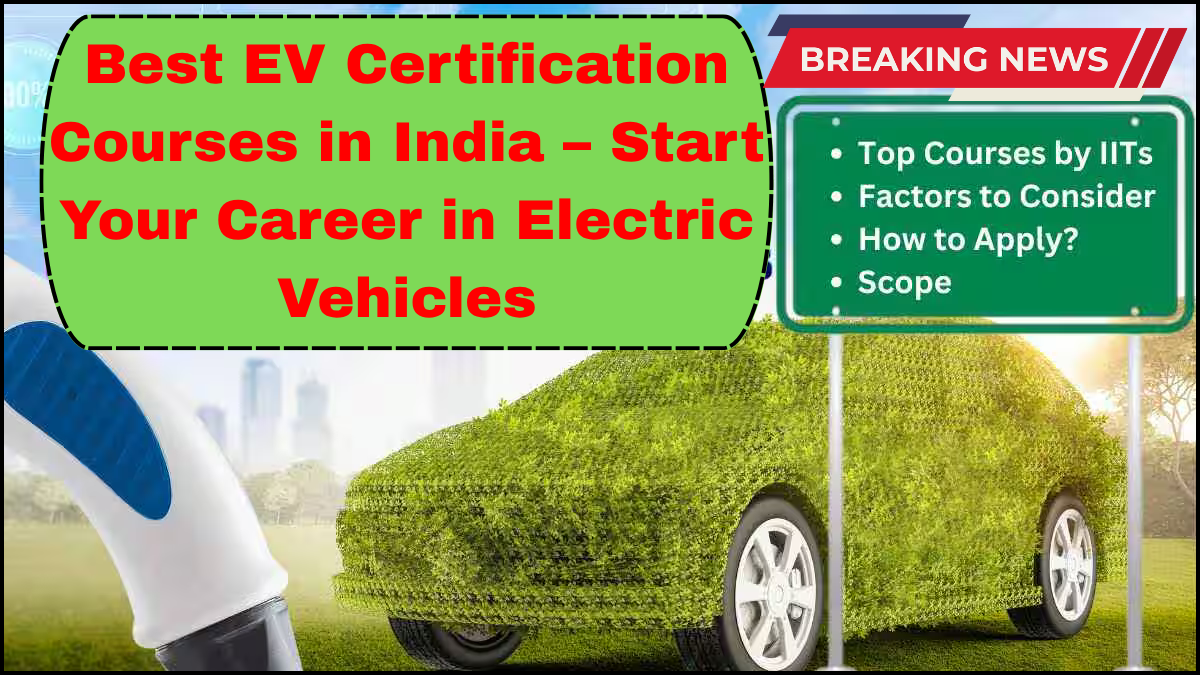India is shifting gears toward an electric future, with the electric vehicle (EV) industry at the center of this transformation. As the government pushes for cleaner transportation and manufacturers invest heavily in EV infrastructure, the demand for skilled professionals is soaring. If you’re looking to build a career in EV, enrolling in a certified course is a smart first move. Here’s a breakdown of the best EV certification courses in India, what they offer, and how they can help you break into this fast-growing sector.

Why EV Certification Courses Matter
The EV industry is multidisciplinary—drawing from mechanical, electrical, and computer engineering, as well as environmental science and business. EV certification courses bridge the gap between traditional education and the specialized skills needed to thrive in this evolving space.
Whether you’re a student, a working professional, or an entrepreneur, these courses can give you a competitive edge by providing hands-on experience, real-world case studies, and exposure to the latest technologies like battery management systems, electric drivetrains, and power electronics.
Top EV Certification Courses in India
1. IIT Madras – Certificate Program in eMobility and Electric Vehicle Engineering
Offered by: IIT Madras in collaboration with Industry Partners
Duration: 6 months (Online + Hybrid Learning)
This program is designed for engineering graduates and working professionals. It covers key areas like electric powertrains, EV architecture, battery technology, control systems, and charging infrastructure. The course includes industry projects and mentorship from EV experts.
Why it stands out: Prestigious institution, high industry relevance, and strong alumni support.
2. Skill-Lync – Post Graduate Program in Electric Vehicle Design and Development
Duration: 12 months (Online)
Focused on real-world engineering applications, this course includes modules on MATLAB, Simulink, embedded systems, and vehicle dynamics. You’ll also learn about powertrain development, thermal management, and motor control.
Ideal for: Mechanical, electrical, or electronics engineers looking to pivot into EVs.
3. ASDC (Automotive Skills Development Council) – Certified EV Technician Program
Duration: 3–6 months
Mode: Blended (online theory + practical workshops)
This course is tailored for technicians and vocational students. It covers fundamentals of electric mobility, safety standards, diagnostics, and servicing of EVs.
Key benefit: Hands-on training and industry-recognized certification for job-readiness.
4. NPTEL – Electric Vehicles (By IIT Roorkee)
Duration: 8 weeks
Cost: Free (Certificate available for a fee)
Part of the government’s SWAYAM initiative, this course is academic and theoretical but provides an excellent foundation in vehicle modeling, battery sizing, motor types, and performance analysis.
Best suited for: Students seeking to strengthen academic concepts before joining the workforce.
5. DIYguru – Certified Electric Vehicle Nanodegree Program
Duration: 3–6 months
Mode: Online
This course includes over 120 hours of video content, covering EV design, battery tech, simulation tools, and policy frameworks. It also offers placement assistance and a capstone project.
Highlights: Industry collaboration, project-based learning, and flexible pace.
How These Courses Can Accelerate Your Career in EV
Completing a recognized EV certification course can unlock a range of roles such as:
-
EV Design Engineer
-
Battery Management System Engineer
-
Charging Infrastructure Specialist
-
Vehicle Diagnostics Expert
-
R&D Associate in EV startups
Companies like Tata Motors, Mahindra Electric, Ola Electric, Ather Energy, and global players like Tesla and Bosch are actively hiring trained professionals.
Moreover, a certified background in EVs increases your chances of landing internships, government-backed green tech projects, or even launching your own EV startup.
What to Consider Before Enrolling
-
Curriculum Depth: Look for programs that offer a good balance of theory and practical exposure.
-
Certification Value: Ensure the certificate is industry-recognized and can boost your resume.
-
Instructor Credentials: Opt for courses led by professionals with field experience.
-
Career Services: Courses with placement support or industry tie-ups offer better ROI.
-
Learning Format: Choose based on your schedule—online for flexibility, offline for hands-on labs.
FAQs
Q1: Are EV certification courses worth it?
Yes. As the EV sector grows, certified professionals are in high demand. These courses help bridge the skill gap and make you job-ready.
Q2: Who can enroll in an EV certification course?
Anyone with a background in engineering, science, or vocational training can apply. Some courses are also open to final-year students and working professionals.
Q3: What is the average salary after completing an EV certification course?
Entry-level roles can start at ₹3–6 LPA, with mid-level and specialized positions going up to ₹10–15 LPA depending on experience and expertise.
Q4: Which is the best online EV course in India?
Courses by IITs (through NPTEL), Skill-Lync, and DIYguru are among the top online options due to their comprehensive content and industry focus.
Q5: Can I get a job abroad after completing an EV certification course in India?
Yes, especially if the course has global accreditation or includes tools and skills in demand internationally, such as MATLAB, Simulink, and BMS design.
click here to learn more